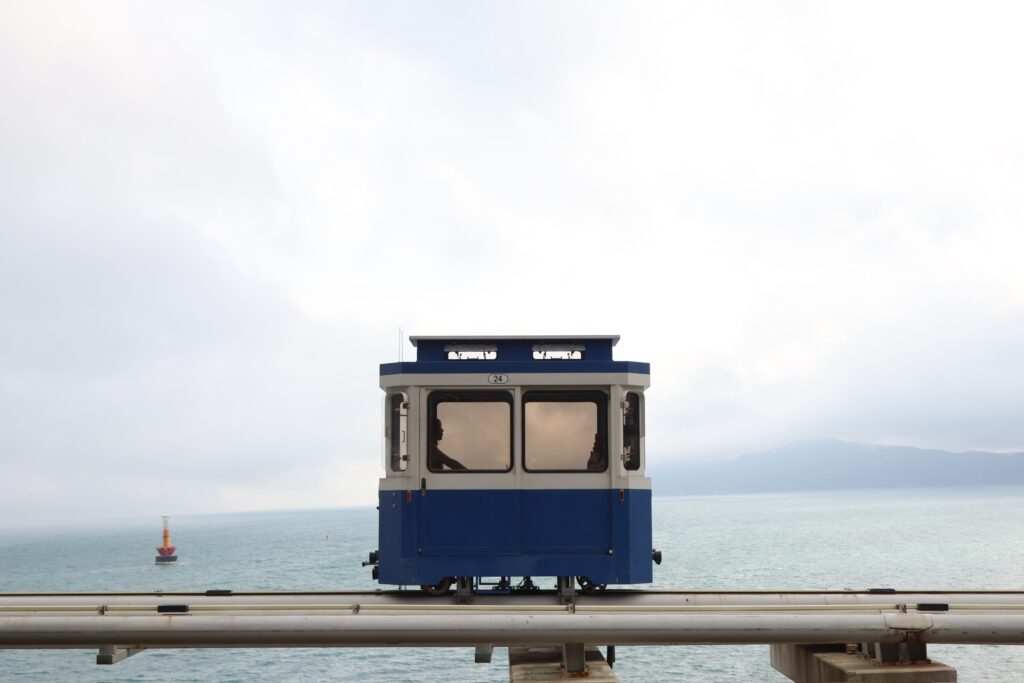Now that the semester is wrapping up, I’ve had some time to reflect on my time in Korea and how it compares to other places I’ve visited. During these four months, I also traveled to China and Japan, which gave me useful context to think about what Korea does well and where it falls short. This is meant to be a straightforward and honest review based on my own experience. If you’re considering studying in East Asia, this might help you figure out whether Korea is the right fit for you.

(Blue Line Sky Capsule Train – Busan, South Korea)
THOUGHTS ON KOREA
Education System
Academically, Korea was a mixed bag. Most of the classes I took had very few assignments, just a midterm, a final, and maybe one group project. In theory, that offers more freedom, but in practice it made things harder. There’s a heavy emphasis on memorization over understanding, and some professors didn’t really explain why we were learning certain things. One of my professors said he was making the class easy by cutting down how much we had to memorize. But that just meant he gave us a list of Excel results to memorize, without teaching us what they meant or how to use them. It felt like I was doing double the work by sitting through lecture to check attendance, then going home and reteaching myself everything in a way that actually made sense.
The strict attendance policies also didn’t help. You were expected to show up to every class regardless of whether anything new was being taught. That, combined with the surface-level teaching approach, made the academic side of things feel more performative than practical.
Social Experience
The biggest challenge by far was how difficult it was to connect with Korean locals. Even after being here for months, I often felt like an outsider. Most students were polite but distant, and even the ones I saw regularly didn’t seem comfortable talking to me. I played table tennis nearly every day at the Korea University Table Tennis Club and interacted with the same people several times a week. But even then, things never moved beyond surface-level interactions. I remember one day in particular: I was sitting and chatting with one of the guys while we waited for a table to open. We talked for around 20 minutes, and he had already agreed to play with me once one freed up. But when another Korean walked in, he got up mid-conversation, walked across the room without saying anything, and started talking with him instead. When a table finally opened, the two of them just went to play together, as if our earlier conversation never happened. This wasn’t some isolated case either; things like this happened repeatedly.
I’m sure some of it had to do with language. A lot of Korean students seemed hesitant to speak English, and maybe some were embarrassed or self-conscious about their skills. But over time, I got the sense that it wasn’t just about the language. There’s a kind of social hesitation or inwardness that makes it difficult to build connections if you’re not already part of the group. In some cases, it even felt like we were actively being excluded. For example, a few restaurants wouldn’t serve us unless we had a Korean speaker with us, even though the menu had pictures or English. It created this feeling that no matter how long we were here, we weren’t really welcome in the same way.
Food
Korean food gets a lot of hype, and while it was decent at first, it didn’t hold up over time. Outside of Korean BBQ and fried chicken, there honestly weren’t many uniquely Korean dishes that I came across often, especially around Anam. Most of the restaurants near campus served Japanese food, Chinese food, or Western meals. I ended up eating things like ramen, katsu, dumplings, and burgers more often than anything Korean.
Meals usually cost around $10, which adds up, especially when the quality wasn’t that great and the food started to feel repetitive. On top of that, a lot of restaurants had odd hours, some didn’t open until late morning, closed in the middle of the afternoon, and then shut down by early evening. It made eating out inconvenient, especially on weekdays. And while it wasn’t common, I did have a few places refuse service when I didn’t speak Korean, which left a bad impression. All of this combined made the food scene feel more closed off and less welcoming than I expected.
City and Culture
At first glance, Seoul is a great city. It’s clean, developed, and full of energy. But after a few weeks, it started to feel more like a city built around work than one made for living. The atmosphere is very structured and serious, and people seem to be in a constant rush. Outside of a few tourist friendly districts, there’s not much spontaneity. People keep to themselves, and the overall vibe is less social and more businesslike.
Seoul also doesn’t feel as dynamic or varied as other major cities. While it’s huge in terms of size, the city is pretty homogenous, and the excitement wears off quickly if you’re here for more than a short visit. The nightlife is fine in specific areas, but those places start to feel the same after a while. After a few weeks, it began to feel more like a place people work and commute in, rather than one that offers something new every day.
The subway system in Seoul is efficient, clean, and very affordable. It’s one of the strongest parts of the city. That said, the sheer size of Seoul means that even with good transportation, it can take up to 2 hours to get from one end to the other. A lot of people end up sticking to the areas near to where they live because it’s too much of a hassle to go to some of the further places. The districts most international students want to explore, like Hongdae, Itaewon, or Gangnam, were usually 30 to 45 minutes away from Korea University. That doesn’t sound like much at first, but it definitely limits how often you feel like going out to explore.

(Great Wall of China – Beijing, China)
COMPARING CHINA AND JAPAN
Having the chance to travel to both China and Japan during the semester gave me a much clearer sense of how Korea fits into the broader East Asian study abroad experience. While my time in both countries was brief, the contrast in atmosphere, culture, and overall feel stood out immediately.
China, especially Beijing, felt far more social and open than Korea. People were quick to talk with us, practice their English, or ask questions. It created a much more interactive and curious environment. I got the sense that people were genuinely interested in others, and that made a huge difference in how welcome I felt, even as a short term visitor. Another thing that stood out was how many kids and families were out in public, which gave the city a younger, more lived in feel. In Korea, by contrast, I rarely saw children, and the lack of them added to the cold, work only atmosphere.
Everything in China also felt more affordable and accessible. Food was incredibly cheap, usually around $3 to $5, and came in large, varied portions. It was easy to try different dishes without spending much. Public transportation was efficient, and while the city was crowded, it felt lively rather than overwhelming. The historical sites, especially the Great Wall and the Forbidden City, gave the trip more depth and made it feel like a place with layers worth exploring.
Japan was different, but still a better fit in many ways. The culture felt more reserved than China’s but more respectful and comfortable than Korea’s. Even if people didn’t start conversations, I never felt out of place. Tokyo was clean, organized, and easy to navigate. The food was incredible. Almost every meal I had, even at chain spots, was memorable for its quality and care. While prices were slightly higher than Korea, it felt justified. The culture also had more of a unique identity that stayed interesting over time, even in a short visit. It felt like a place you could live in for months and still be learning something new.
This isn’t to say Korea was a bad place to study abroad, it just wasn’t the most exciting or rewarding option for someone looking for an immersive cultural experience. If you have a specific reason for wanting to study in Korea, like an interest in the language, pop culture, or something else unique to the country, it can still be a good fit. But if you’re just looking for the best overall experience in East Asia, China or Japan would be far better choices. They felt more open, more culturally engaging, and simply more enjoyable across the board.
